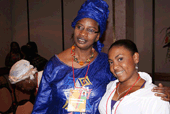Women of African descent demand commitment against double discrimination in Cali
Published on Fri, 2011-06-10 14:09
Sources Black women from Latin America, the Caribbean and Africa demanded this week a firm and final commitment to equality and the end of discrimination from governments and the international community, at the closing of the Second International Meeting of women of African descent held in Cali, Colombia. The four-day debate was based on the assumption that Latin Americans of Arfican descent face double discrimination on the grounds of gender and race, explained the president of the organizing committee, Consuelo Cruz Arboleda, native of Cali and leader of Diáspora, an institution based in Spain and organizer of the meeting. The absence of “women of African descent in public and private power positions”, forces us to strengthen efforts to achieve “their visibilization and empowerment, above all in political spaces”, argued Cruz. According to the activist, these aims will only be achieved through public policies. The proposals put forward in this respect by the participants in the meeting held in Cali will be delivered, among other institutions, to the United Nations Organization (UN) and the Organization of American States (OAS). The challenge is to “reinforce the political commitment to eradicate discrimination” and also to encourage “the promotion and visibility of the Latin American reality, which poses diversity as a social asset”, said Pedro Zerolo, UNAIDS officer for Latin America and the Caribbean and representative in Cali of the Social Movement of the Spanish Socialist Workers’ Party (PSOE), according to his statements reported by the Colombian newspaper El Informador. The First International Meeting of women of African descent took place in Madrid in 2009. On this second occasion, participants created an observatory to monitor the fulfilment of commitments undertaken by authorities. Cali ranks second Latin American city in terms of population of African descent (26.2 per cent), and Colombia is ranked second among countries showing these characteristics. Such conditions were fundamental to make Cali replace Côte d’Ivoire as conference headquarters in 2011, declared International Year for People of African Descent by the UN. Cali’s Mayor, Jorge Iván Ospina, told the audience that black women are among the most affected people in his district in terms of high mortality, extreme poverty, ill-treatment and displacement, a situation that forces Cali’s society “to take a look inward”. The following women were among the Colombian participants: former Congresswomen María Isabel Urrutia and Piedad Córdoba; the Mayor of Cartagena, Judith Pinedo Flórez; the representative of the Office of Black, Colombian African-descendant Raizal and Palenquera Communties of the Ministry of the Interior, Vanesa Palomeque, and the actress, model and businesswoman Belky Arizala. The meeting was also attended by foreign participants such as the Spanish officer, Laura Ceara, director of the governmental Women’s Institute; Maria Tejada Gámez, also from Spain; Elizabeh Viveros (Ecuador), Cecilia Moreno Rojas (Panama), Lena Mbaya, Mariama Badji (both from Senegal), Khady Sakho (France-Senegal), Elizabeth Suárez García (Uruguay), and Kathurima Winnie-Imanyara (Kenya), among many others. Vanessa Palomeque, officer of the Ministry of the Interior, stated that steps should be taken to ensure the inclusion of women both by the government and Congress. She added that notwithstanding the high unemployment and social inequality, “we were invisible and now there are spaces such as this meeting, that help to make problems visible”. |


